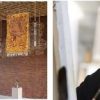Goa is abuzz with excitement as vintage bike and car owners, users, collectors and fans are decking […]

STOP THE COMMUNIDADE LAND LOOT IN TIVIM!
Uncategorized October 24, 2025By Praveena Sharma
With little direct benefits accruing from the Pune-based Maharashtra Academy of Engineering and Educational Research’s (MAEER) private university project on the Communidade land in Tivim, villagers and activists are fiercely resisting it
Goa’s Communidades – a system of collective landholding and management of natural resources – that have survived for several centuries now seem to be crumbling as profiteering investors, businesses and corrupt politicians look for their next hunting ground.
To their dismay, the State’s vast tracts of land, owned by over 200 Communidades, have caught the sight of those looking to make fast bucks or woo electorates.
This has led to large scale encroachments and illegal occupation on Communidade land, legal disputes over tenancy rights and ownership, land grabbing by government for public projects and a whole host of other problems.
The latest to fall prey is the Communidade of Tivim. A private university MIT-World Peace University – funded by a Pune-based charitable trust Maharashtra Academy of Engineering and Educational Research (MAEER) – is planning to develop and run an educational institute over a 2-lakh-sqm land of Tivim Communidade.
For this, MAEER has already entered into a lease agreement (read the box on The Sweet Deal for details) for 99 years with the Communidade of Tivim on May 31 last year. Despite this lease deed and approvals from concerned authorities in place, the project is being fiercely resisted by the people of Tivim Village.
A Communidade activist, who did not want to be named, told Goan Observer he feared the project was being executed “under government pressure”. He said if that was the case then it should be terminated.
“If it is being done under government pressure then it needs to be stopped. It looks like they (government) are managing to influence some of the Communidade members and are giving them benefits on the side,” he elaborated.
The activist, who is also involved with town planning and operations of Communidades, said the proposed private university will not benefit the villagers of Tivim ( read the box Short-changed?); “It’s all being done for the outside people and is only for money-making”.
Jocel de Souza, who closely works on issues related to Communidades, echoed the activist’s sentiment saying Communidades must use the land for “the direct benefit of the indigenous community”.
“The Comunidades have always granted land on aforamento(an ancient form of perpetual lease) for the direct benefit of the indigenous community (which in turn benefits the larger community) namely for agricultural, residential, institutional and social purposes, but have always retained perpetual and absolute ownership rights,” explained de Souza.
According to him, the government’s intentions to attract private investors to develop Communidade land or any kind of institution is not very clear. He believes they do not abide by the Code of Communidades unless the Communidadescontinue to retain “absolute and full ownership rights” over their lands.
The lease deed between the Communidade of Tivim and MAEER show it is for 99 years and “automatically renewed in perpetuity on the same terms and conditions”.
He said the ancient system of Communidade had seen massive erosion in the recent years “mainly due to abuse of power by the political class and their implants inside the Communidade committees”.
Godfrey D’Lima, political activist, also feels many of the committee members were colluding with businessmen and politicians and handing over Communidade land for commercial purposes, which do not serve the interest of natives or Communidade members and their families.
He said Goa did not need another university. Instead, he called for the existing educational institutions to be upgraded and maintained.
“Why are we wanting all these universities to come to Goa. Tomorrow, they will only destroy our hills and environment and create an urban nightmare in the State. There are already so many universities in Goa. Now, you want Parul University and World Peace University also to come here. Why doesn’t the government upgrade the existing private schools and colleges in Goa?” he lamented.
Every move of the government till now indicates it has worked towards making these universities a reality in the State. It not only marked an area as “public or institutional” zone for educational projects on the Regional Plan, 2021 but also cleared an amendment bill for Code of Communidades.
In March 2025, it even amended the Goa Private Universities Act, 2020, to facilitate the establishment of private universities. The amendment stipulates developer of educational project in the State must own or lease land not less than 50,000 sqm for at least 30 years exclusively for educational purpose.
All these moves by the government have paved the way for private universities to make a beeline for Goa and made it easy for them to usurp the Communidade land.
“The State government has set wrong precedents in amending the Code of Communidades in the past. They have trespassed into Communidade territory. The role of the government is only to provide administrative guardianship. The Code can be amended only after a scientific study and taking into confidence all well-meaning Components to protect and strengthen the Communidades, but what we have experienced since the 1990’s and the 2000’s is the slow erosion of truth, goodness and beauty of the soul of the Communidades,” said de Souza.
He called for people to have an open mind to “constructive steps” taken by authorities.
“Lately, the only reaction that we can observe from the masses is opposition and protests. Although it is good to oppose destructive decisions and actions. It is even better for good minds to come together and scientifically study what is good for the future and take constructive steps towards that goal. What we can see is either the masses are just rebellious or every decision taken by those currently in authority is selfish and destructive. Either way it points towards prevalent system failure,” he said.
Putting a private university in the category of institutional body, he said it was within the rights of a Communidade to weigh whether it was beneficial to their community in the long run. Especially, if a Communidade succeeded in retaining its absolute ownership rights during and after the expiry of the afforamento.
He, however, decried the losing grip of the Communidadeover its land and resources over the last few decades.
“The Communidades have experienced a downward trend in terms of land governance in the last few decades. Goa did not have any issues with land use planning prior to that as Communidades exercised moral authority over the use and management of their own land. Now we have access to more advanced scientific knowledge but we have the wrong people in positions of power and administration. Many opine that this is due to contradictory laws like the Land Revenue Code, Agricultural Tenancy Act, Town and Country Planning Act, etc. We need a second glance at these laws because the effects and results are there for everyone to see,” suggested de Souza.
Today, on the surface of it all, the MAEER’s university project on Tivim Communidade’s land ticks all the legal rules and norms because of amendments in various laws governing it, a pliant administrator and “implants” in Communidadecommittees.
But it still has to pass the muster of the villagers in Tivim and other members of other Communidades, who have decided to fiercely oppose private university projects on their land.
Short-Changed?
The Code is very clear that gains from the use of Communidade land and resources should accrue to the zonnkars (members of Communidade by birth), shareholders and their families.
This seems to be severely breached in Tivim Communidade’s deal with Maharashtra Academy of Engineering & Educational Research (MAEER) for building a private university on 2-lakh-sqm land owned by it.
Apart from the Communidade land earning annual lease rental below the current market rate, the educational institute being developed on it does not offer many benefits to the zonnkars, shareholders and their families.
They could be bamboozled by the sugar-coated tution-fee concessions, scholarships and employment promise by the lessee or MAEER.
1) MAEER has agreed to offer 50% concession on tution fee to students belonging to the family of the Tivim Communidade “purely on merit basis for admission to the institutions, under the proposed Goa Campus and World Peace University (WPU), Kothrud, only subject to the condition that the concerned candidates belong to the family of the Components of Tivim Communidade and are residents of either Goa or, in and around, Pune”.
This could exclude boy students and non-meritorious Tivim applicants. ‘Merit’ is not defined.
2) An annual financial scholarship of Rs20,000 is being offered to only girl students belonging to the “families of the Components of the Tivim Communidade” and that to those scoring more than 95% marks in Class 12th examinations for pursuing further education until they complete their “Master” on regular basis “without term/semester” break on account of academic performance.
The condition for the scholarship narrow down number of students eligible from Tivim by setting a very high cut-off marks for it.
3) Another financial assistance by the developers of the Tivim Communidade land mentioned in the deal talks is of “all girl students belonging to the families of the Components of the Tivim Communidade scoring more than 90% marks in Class 12th examinations shall be given financial scholarship of Rs. 10,000 per year by the Lessee for pursuing further education until they complete Masters on regular basis without term/semester break on account of academic performance”.
The condition of girl students scoring 90% in Class 12 and completing their post-graduation without a break may see many candidates from Tivim Communidade excluded.
4) The employment offer also appears to be an eyewash. The deal states; “the lessee will give preference to the family of the components of the Tivim Communidade and the villagers of Tivim in employment at Goa campus (of MAEER) subject to availability of vacancies and suitability on merit.
The catch is in the next sentence, which says; “the lessee covenants that 10% of the total workforce in Class Ill and Class IV employment at the Goa Campus shall be reserved for the family of the components of the Tivim Communidade, subject to merit”.
The three operative words here are ‘Class III’, ‘Class IV’ and “subject to merit”. These mean only positions of clerical or supervisory roles and manual or support functions, like peons or helpers, would be open to the members of Tivim Communidade. That too would be based on merit and only 10% of it would come their way.
The Sweet Deal
MIT-World Peace University, proposed to be built over a 2-lakh-sqm of land in the Tivim Village of North Goa by a Pune-based trust Maharashtra Academy of Engineering & Educational Research (MAEER), has entered into a pact with the Tivim Communidade – an ancient landholding and distribution system predating the Portuguese era in Goa.
The Goan Observer has access to a copy of agreement between the two parties. The sugary pack reveals vast tracts of land has been handed to the private university at a throwaway price of Rs 12.50 per sqm per annum, way below the market leasing rate in the area.
The current “circle rate” for sale of Tivim plots range between Rs4,504 and Rs9,778 per sqm. In some areas, it can go up to as high as Rs22,000 per sqm. An approximate annual lease rental rate for a commercial plot can up to over Rs500 per sqm.
The key features of the deal:
• The Tivim Communidade’s lease deed for land for private university is for a period of 99 years – beginning July 1, 2024 and ending on June 30, 2123. It will be automatically renewed in perpetuity on the same terms and conditions.
• At the lease rate at Rs12.50 per sqm per annum, the university will pay a rental of Rs25 lakh per year to the Tivim Communidade. This works out to around Rs2.08 lakh per month for the 2 lakh sqm land being leased to the private university.
• The lease rentals would be enhanced by 5% every three years. Besides this incremental rise in rentals, there would be no escalation in the base rent charged to the university. The agreement clearly states; “it is distinctly the rent as agreed shall remain unaffected by change/revision in ready reckoner rate or any other notification/circular issued by competent authority”.
• The average yearly lease rental for the 99-year lease works out to over Rs60 lakh. The lessee – the MAEER – has also transferred a refundable deposit of around Rs5 crore to the Tivim Communidade.
• MAEER has shelled out stamp duty of Rs17 lakh and a registration charge of over Rs16 lakh to local government authorities.
Code of Communidade
Communidades have existed much before the Portuguese landed in Goa. They were known as Gaunkaris. Each of them operated as a cooperative, which collectively owned and managed agricultural land, water bodies and forests.
They were governed by unwritten rules that were later codified by the Portuguese and came to be known as Code of Communidade.
Under the Code, the Communidades – groups of them were called “torofos” – are recognised as associations of “zonnkars” (members by birth) and shareholders, having communal land, rights and obligations.
The Code provides the legal basis for how Communidade lands and institutions can function. They also articulate the rights of zonnkars and shareholders and land use for the collective gains of every member of the Communidade.
These Codes specify a Communidade’s constitution, internal governance, rights and duties of zonnkars, revenue and profit sharing, use of land and other such matters.
After Goa’s liberation in 1961, they continued to be in force and the State government translated and republished an English version with some amendments and new rules.
Today, around 223 Communidades exist in Goa and are said to own over 30% of the State’s land.
The articles of the Code clearly define the statutes governing Communidades and Torofos and chalks out their maps. They also have records of zonnkars (members by birth) and shareholders. Some Communidade members can be both.
One of articles is on calculations and distribution of zonn – annual income of zonnkars – and dividend (for shareholders).
The Code specifically mentions only the zonnkars and shareholders have rights and duties under its landholding system and only they are entitled to profits and losses of Communidades.
There are several articles in the Code dealing with administration, meetings, revenues, leases, compromise, powers of tribunal and other such details.
In July this year, Supreme Court held that under Article 30 (4)(g) of the Code, a Communidade cannot unilaterally enter into compromises without sanction of a tribunal.
In 2024, the State government approved an amendment to the Code restraining change in the use of Communidade land for purposes other than those allotted for.
This has been widely criticised by some of the prominent Communidades members, who contend the State government lacks the legislative wherewithal to amend the Code.
These amendments to the Code by the government are facilitating use of the Communidade land for wider purposes. One of the entities, which has benefited from such a move is the MAEER, which has entered into lease agreement with Tivim Communidade to build a private university over 2 lakh sqm of land.















